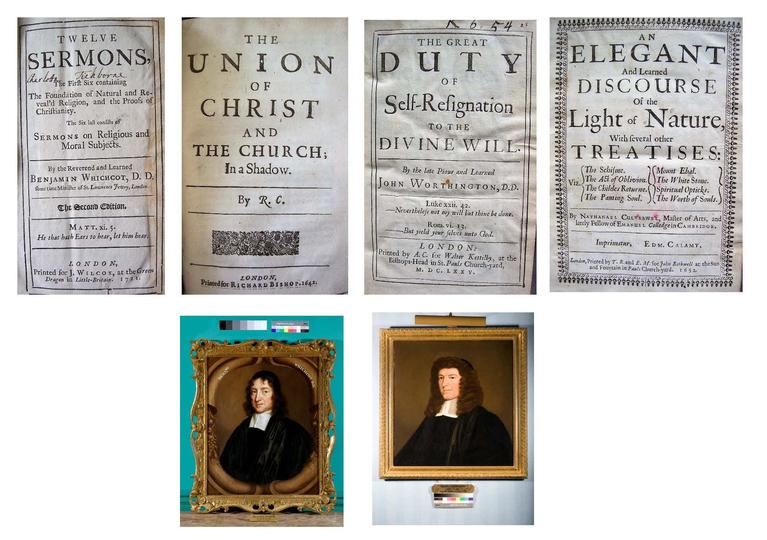Blog
23 July 2020

The group of seventeenth-century thinkers now called ‘The Cambridge Platonists’ might equally well have been called ‘The Emmanuel Platonists’ since all but one of its principal figures were students and Fellows at Emmanuel. In their lifetimes they did not think of themselves as a group or movement, did not call themselves Platonists, and much of their work was only published posthumously. But by the eighteenth century they had been christened the ‘Cambridge Platonists’, and their contribution to moral philosophy is a major source for modern ethical theory and ideas of tolerance. They were the first philosophers to write primarily and consistently in the English language, and they coined such terms as ‘materialism’ and ‘consciousness’. Their views were developed in reaction to the stern Calvinistic scholasticism prevailing at Cambridge in their formative years. They held Plato and Plotinus in great regard, and their respect for ancient philosophy convinced them of the eternal existence of moral principles and truth. They were very up-to-date with developments in philosophy, reading Descartes and Spinoza, but rejecting the new mechanistic natural philosophy and repudiating Hobbes. They were convinced of the compatibility of reason and faith, and did not accept that ritual, church government, or detailed dogma were essentials of Christianity. They did not live apart from their times. Two of the Emmanuel Platonists, Whichcote and Cudworth, were on the committee of sixteen divines with whose advice Cromwell decided on the readmission of the Jews to England in 1655. Protestant Emmanuel was a source of substitutes when Royalist heads of Cambridge colleges were ejected by the Cromwellians: Whichcote and Worthington were appointed at King’s and Jesus (and were then in turn ejected at the restoration of Charles II); Cudworth was appointed at Clare but resigned early, allegedly because Clare would not pay him.
Benjamin Whichcote (1609-1683) was the earliest of the ‘Platonists’, but the main source for his tolerant, optimistic and rational philosophical views are his posthumously published sermons, which amount to a consistent body of ethical teachings. For Whichcote, human nature is rational and perfectible, and God communicates with man as much through reason as through revelation. Like other Emmanuel Platonists, Whichcote emphasises interior spirituality over the externals of religion (which, of course, offended those who prized the latter). Whichcote’s Emmanuel pupil John Worthington (1618-1671) was an active translator and editor of philosophical works.
Ralph Cudworth (1617-1688) was perhaps the most significant of the group, publishing major work in his lifetime, although important material remains unpublished in manuscript. For Cudworth, as for Plato, soul is ontologically prior to the physical world. Mind precedes the world, and ideas and moral principles are eternal and self-subsistent things. Since our minds mirror the mind of God we are furnished with the ability to reason, and Cudworth posits a ‘Plastic Nature’ that acts as an intermediary between the divine and the natural world, through which God makes his wisdom and goodness intelligible through created nature. Much to his disgust, Cudworth’s refutations of atheism in his The True Intellectual System of the Universe (1678) were criticised for showing too much tolerance, with a supposedly crypto-atheistic intent. His daughter Damaris Cudworth (1659-1708) may be seen as one of the early women writers of philosophy in England. She was a friend of John Locke, corresponded with Leibniz, and, despite chronic eyesight problems, published two books: A Discourse concerning the Love of God (1696) and Thoughts in reference to a Vertuous or Christian Life (1705). Her thinking is a mix of her father’s Platonism, Lockean theories and arguments, and her own proto-feminist advocacy of education for women and a life of reason.
The short life of another Emmanuel Platonist, Nathaniel Culverwell (1619-1651) meant that his important Discourse was published posthumously. The Discourse resonates with the humanist spirit and liberal theological outlook of Whichcote. Culverwell conceives of God as an intellectual being who communicates with man through reason which is the ‘light of nature’, an ‘intellectual lamp’ placed by God in the human soul. Culverwell is optimistic about human capacities, seeing all human minds as furnished with ‘clear and indelible’ principles of reason and morality, such that we become more like God through the exercise of reason. The College Library’s copy of Culverwell’s Discourse has been dedicated by its donor in an inscription to the Master ‘and to the Fellows of that religious and happy foundation’.
Barry Windeatt (Keeper of Rare Books)
Images by Helen Carron (College Librarian)
